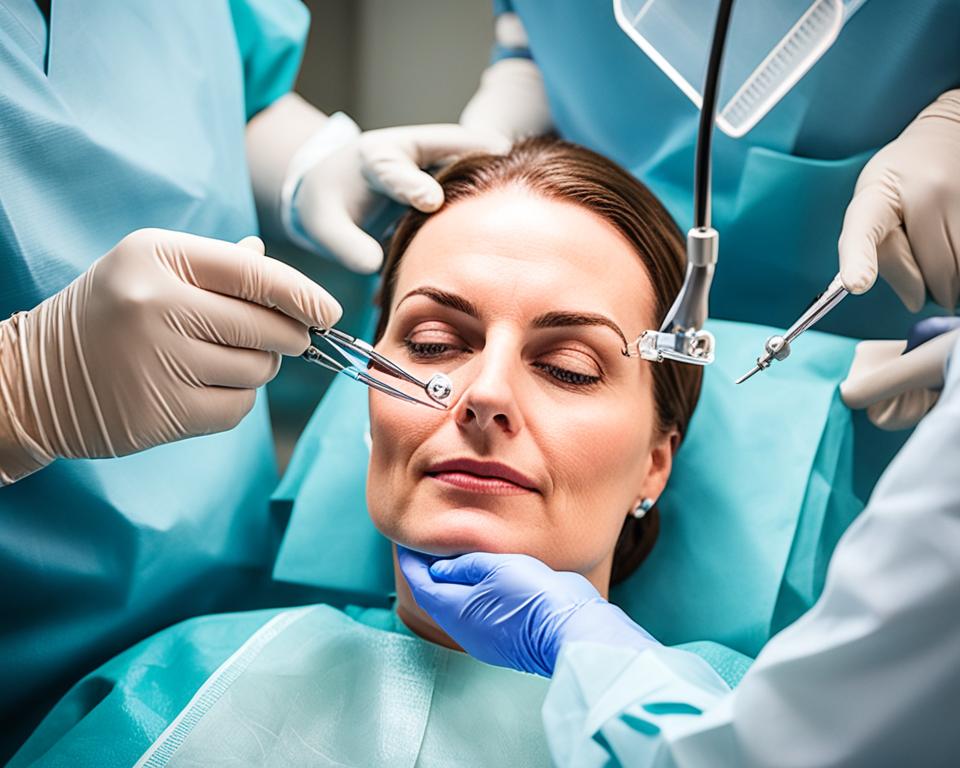
In the world of cosmetic enhancements, hairline lowering surgery is making waves. It’s also known as forehead reduction or hair advancement. This surgery lets people change their look for the better, making their face look more balanced and youthful. By moving the hairline down, it can greatly change how you look, boosting your confidence and self-esteem.
This surgery is for those with a high forehead or a receding hairline. It’s a way to fix these issues and make your face look better. This guide will cover the details of hairline lowering surgery. We’ll talk about its benefits, the surgery itself, and what to expect when you’re recovering.
Read interesting things at : luoghievisioni
Key Takeaways
- Hairline lowering surgery is a cosmetic procedure that can dramatically improve one’s appearance by lowering the hairline and creating a more balanced, youthful facial profile.
- The surgery addresses a variety of concerns, including a high forehead due to male pattern baldness or a naturally receding hairline.
- Hairline lowering can restore a more harmonious facial proportion and enhance one’s overall features.
- The procedure involves specialized surgical techniques to lower the hairline and improve the appearance of the forehead and brow area.
- Patients can expect a transformation in their appearance, with a more balanced and rejuvenated look after the surgery and recovery period.
What is Hairline Lowering Surgery?
Hairline lowering surgery, also known as forehead reduction or scalp advancement, changes the hairline to a lower, more pleasing spot on the forehead. This method helps people with a high or uneven hairline look better balanced and more harmonious.
Understanding the Procedure
The main aim of this surgery is to move the hairline forward for a younger, more balanced look. It uses techniques like scalp advancement or hair transplantation. The choice depends on the person’s face and what they want to achieve.
Advantages of Lowering the Hairline
- Enhances overall facial balance and symmetry
- Boosts self-confidence and self-esteem
- Conceals a high, receding, or uneven hairline
- Provides a more youthful and rejuvenated appearance
- Improves the proportions of the forehead and face
Hairline lowering surgery, forehead reduction, scalp advancement, and frontal hairline restoration can greatly change how a person looks and feels about themselves.
Candidates for Hairline Lowering Surgery
People looking into hairline lowering surgery often have a high or receding hairline. They might also have male pattern baldness or other issues that affect the frontal hairline. This surgery can help those wanting a more youthful, balanced, and pleasing look.
Here are the main groups of people who might be good candidates for hairline lowering surgery:
- Those with a high or receding hairline because of genes or aging
- Patients with male pattern baldness, which leads to hair loss and a higher frontal hairline
- People wanting a hairline that matches their face better
- Those who have had frontal hairline restoration before and want more improvement
This surgery can make the hairline lower, giving a more youthful and balanced look. It can also boost confidence and self-esteem for those unhappy with their high or receding hairline.
“Hairline lowering surgery has been a game-changer for me. It’s allowed me to feel more comfortable and confident in my own skin.”
– Sarah, a happy hairline lowering surgery patient
The Hairline Lowering Surgery Consultation
When you think about hairline lowering surgery, the first meeting with a plastic surgeon is key. They will look at your face and check your hairline. This helps them make a plan just for you, based on what you want and need.
Discussing Your Goals and Expectations
This meeting is your chance to talk about what you hope to achieve. Your surgeon will listen and understand why you want hairline lowering surgery, brow lift, or temporal brow contouring. You’ll talk about what you expect and what the surgery can and can’t do.
Your surgeon might use special technology to show you what the results could look like. This helps you and your surgeon make a plan that fits your look and what you like.
“The consultation is a crucial step in the hairline lowering surgery process, as it allows me to fully understand my patient’s concerns and work with them to achieve their desired results.” – Dr. Sarah Williamson, Board-Certified Plastic Surgeon
Talking about what you want and working with your surgeon ensures the hairline lowering surgery gives you the look you want. It can boost your confidence and improve how you see yourself.
Preparing for Hairline Lowering Surgery
Your surgeon will give you detailed instructions before your hairline lowering surgery. These steps are important for a smooth and successful procedure. They help ensure you get the best results and recover quickly.
One important change is quitting smoking. Smoking can slow down healing and increase risks. Your surgeon will suggest stopping tobacco use before and after the hairline lowering surgery.
You might also need to change or stop some medications. This includes blood thinners or anti-inflammatory drugs. Your surgeon will check your current medicines and tell you how to manage them before the surgery.
Before the surgery, you might need to have some tests. These could be blood work or electrocardiograms. They check your health and make sure you’re safe during the hairline lowering surgery.
It’s vital to follow your surgeon’s advice and go to all your pre-surgery appointments. This helps you prepare both physically and mentally. It makes you feel confident and ready for the new look you’ll get.
“Preparing for hairline lowering surgery is a crucial step in the process, as it sets the stage for a successful outcome and a smooth recovery.”
The Hairline Lowering Surgery Procedure
Hairline lowering surgery changes your look by moving the hairline down. It makes your forehead look better. This surgery uses scalp advancement or hair transplantation.
Scalp Advancement Technique
This method removes a skin strip from your forehead. It moves the hairline down. This makes your forehead look shorter and more youthful.
The surgeon plans the cuts carefully. They stitch the scalp together for a natural look.
Hair Transplantation Technique
For hairline lowering surgery, this method moves hair from the back or sides to the front. It uses your own hair for a natural look. The new hair is placed carefully for a perfect fit.
Choosing between these methods depends on your face, hair, and goals. The surgeon will talk with you to pick the best option for your hairline lowering surgery.
Recovery and Aftercare
After your hairline lowering surgery, you’ll need a few weeks to recover. It’s key to follow your surgeon’s advice closely. This helps manage swelling, ease discomfort, and lowers the chance of problems. By sticking to the aftercare plan, you’ll recover smoothly and successfully.
Managing Swelling and Discomfort
Right after the surgery, you might feel some swelling and discomfort. Your surgeon will tell you to use cold compresses and take pain meds if needed. Make sure to avoid hard work until you’re fully healed. This lets your body rest and heal properly.
Here are some tips to ease your discomfort:
- Apply cold compresses or ice packs to the treated area for 15-20 minutes several times a day
- Take over-the-counter pain medication as directed by your surgeon
- Avoid excessive physical activity and allow your body to rest
- Follow any specific instructions provided by your hairline lowering surgeon
Following these aftercare tips helps you recover better and reduces risks from hairline lowering surgery.
“Taking the time to properly care for yourself during the recovery process is crucial for achieving the best possible results from your hairline lowering surgery.
Potential Risks and Complications
Hairline lowering surgery can make you look better, but it’s important to know the risks. Like any surgery, there could be problems like infection, scarring, and nerve damage. It’s key to talk about these risks with your surgeon before making a choice.
One big worry is getting an infection. The surgeon will work hard to avoid this, but you must follow the aftercare instructions closely. This includes taking your meds and taking good care of your wounds.
Scarring is another thing to think about. The surgeon aims to make scars less visible, but they will happen. How bad the scars are can depend on how well you heal and the surgery method used.
Nerve damage is a serious but rare issue. It can cause numbness or tingling in the area. Surgeons are trained to avoid this by knowing the face’s anatomy well.
- Infection
- Scarring
- Nerve damage
Choosing a skilled surgeon is key to lowering risks. Following all instructions before and after surgery is also important for a smooth recovery.
Deciding on hairline lowering surgery is a personal choice. Weigh the benefits against the risks carefully. Working with your surgeon and following their advice can help avoid problems and give you the look you want.
Hairline Lowering Surgery Results and Timeline
Patients can see the full effects of hairline lowering surgery in a few months. The healing process and final look will show up over time. Results depend on skin type, hair texture, and the surgery’s methods.
It’s key for patients to have realistic hopes. The surgery’s results will keep getting better over time. Right after surgery, there might be swelling and some discomfort. This usually goes away in two to three weeks.
As the area heals, the new hairline forms. This is when patients see the surgery’s full effect. The timeline for the final look varies by person. Most see their ideal results in three to six months.
During this time, the hairline settles, and any needed tweaks might be done. This ensures a look that’s both natural and pleasing.
| Timeline | Hairline Lowering Surgery Results |
|---|---|
| 2-3 weeks | Swelling and discomfort subside |
| 3-6 months | Full results of hairline lowering surgery become visible |
| Ongoing | Hairline continues to settle and refine |
The results of hairline lowering surgery can change a person’s look. It boosts confidence and self-esteem. With a skilled surgeon, patients get a hairline that fits their face and style.
Combining Hairline Lowering with Other Procedures
Some patients pick to add hairline lowering surgery with other facial treatments. This mix can make the face look more balanced and youthful.
Hair Transplant and Scalp Advancement
Combining hairline lowering surgery with a hair transplant or scalp advancement is common. These methods improve the forehead and temples’ look. They fix the hairline’s position and hair density.
A hair transplant moves healthy hair follicles from the back or sides to thinning areas. This makes the hairline look fuller and more natural.
Scalp advancement moves the scalp forward, lowering the hairline. It’s great for those with high foreheads or big brow lift or temporal brow contouring.
Together, these treatments give a balanced, refreshed look. They combine a lowered hairline, fuller hair, and better facial features.

The surgeon will help pick the best procedures for the patient’s look goals.
Choosing an Experienced Surgeon
When looking into hairline lowering surgery, picking a top-notch, board-certified plastic surgeon is key. They should have lots of training and know-how in this special surgery. Plus, they should have a good history of making results look natural and pleasing.
People thinking about hairline lowering surgery should do their homework on surgeons. They should check the surgeon’s credentials and look at results from past patients. This way, they can be sure the surgeon is up to the task and knows how to minimize risks.
| Criteria | Importance |
|---|---|
| Board Certification | Ensures the surgeon has undergone rigorous training and evaluation in plastic surgery. |
| Experience with Hairline Lowering | A surgeon with a strong background in this specific procedure is more likely to produce consistent, high-quality results. |
| Patient Testimonials | Reviewing past patient satisfaction can provide valuable insight into the surgeon’s skill and bedside manner. |
| Hospital Affiliations | Surgeons with privileges at accredited hospitals have access to state-of-the-art facilities and resources. |
By picking experienced surgeons and choosing a skilled one, patients can be sure they’re making the right choice for hairline lowering surgery. They’ll get the look they want.
“The success of hairline lowering surgery hinges on the expertise of the surgeon performing the procedure. Patients should never compromise when it comes to their safety and aesthetic goals.”
Cost Considerations for Hairline Lowering Surgery
Getting hairline lowering surgery is a big step, and you should know the costs. The price changes a lot, based on the surgeon’s skill, where you live, and how complex the surgery is.
Talking openly about what you might pay for this surgery is key. You’ll need to think about the surgery cost, plus pre-op visits, anesthesia, and any follow-up care. This makes it easier to plan your budget.
Many doctors offer payment plans or financing to help with the cost. It’s a good idea to look into these options. Think about how the surgery will improve your life against what you’ll spend.
| Cost Factor | Average Range |
|---|---|
| Surgeon’s Fees | $5,000 – $15,000 |
| Anesthesia | $1,000 – $3,000 |
| Facility Fees | $2,000 – $5,000 |
| Pre-op Consultations | $500 – $1,000 |
| Post-op Care | $500 – $1,500 |
Think carefully about the benefits of hairline lowering surgery and the cost. Working with an experienced surgeon and looking at financing options can help you decide. This way, you can choose what’s best for your goals and budget.
Maintaining Your New Hairline
Keeping up with hairline lowering surgery results is key. Patients need to follow hair care tips, avoid certain styles, and protect their hairline from the sun. This keeps the look fresh and appealing.
Regular visits to the surgeon help keep the hairline lowering surgery working well. They can fix any issues that come up. Following these steps helps keep the new look going strong.
Hair Care Essentials
To keep the hairline looking great, do the following:
- Use gentle, sulfate-free shampoos and conditioners
- Avoid excessive heat styling, such as blow-drying or curling irons
- Limit sun exposure by wearing hats or using sunscreen on the hairline
- Refrain from hairstyles that pull or tug on the hairline, like tight ponytails or braids
Regular Checkups and Monitoring
Working closely with the surgeon who did the hairline lowering surgery is important. Regular check-ins help keep the hairline looking good and healthy.
At these visits, the surgeon checks on the hairline and gives advice. This helps patients keep their new look for a long time.
| Maintenance Tip | Importance |
|---|---|
| Gentle hair care routine | Protects the delicate hairline area |
| Avoidance of tight hairstyles | Prevents unnecessary stress on the hairline |
| Regular surgeon checkups | Ensures the long-term success of the hairline lowering surgery |

“Proper maintenance is key to preserving the transformed appearance achieved through hairline lowering surgery.”
Conclusion
Hairline lowering surgery, also known as forehead reduction, changes how one looks and boosts confidence. It moves the hairline down for a younger, more balanced look. With Dr. Robert Jones’ expertise, patients can see great results and change their lives.
This surgery is great for those with a high or receding hairline. It can make the face look better balanced. When combined with hair transplant or scalp advancement, it leads to amazing results. People feel more confident and happy with their appearance.
For those thinking about hairline lowering surgery, find a skilled surgeon to help you. They will explain the process, its benefits, and the risks. This way, you can make a smart choice and start a journey to a more confident you.






